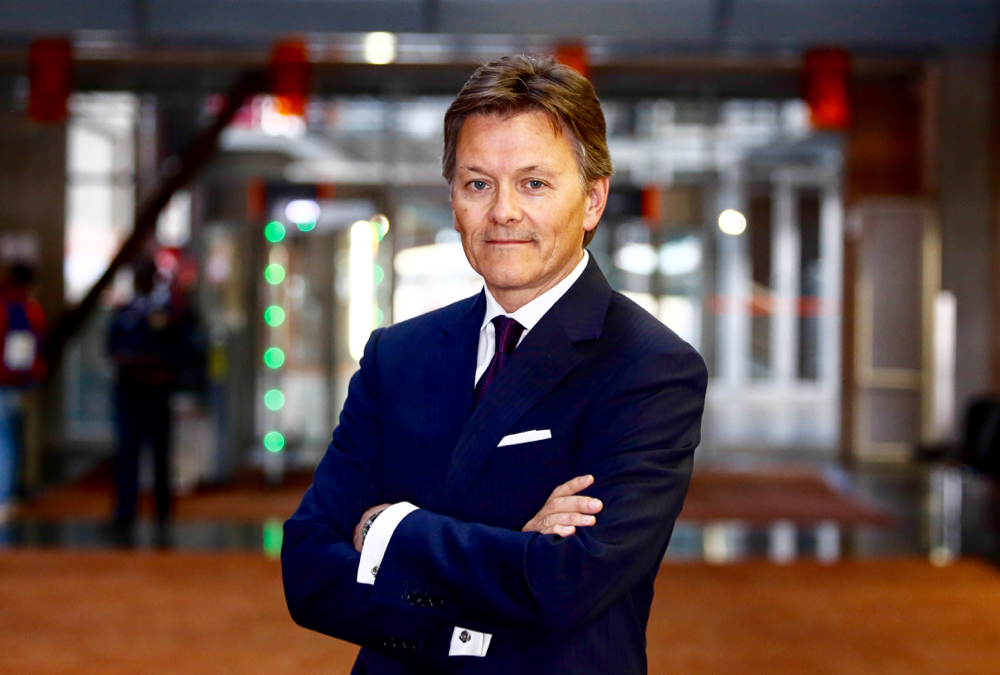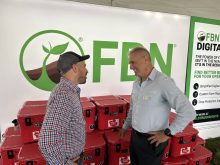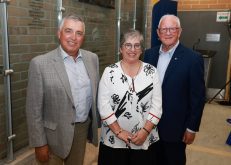No matter where life takes Kelvin Dushnisky, CEO of AngloGold Ashanti of Johannesburg, South Africa, he still considers Manitoba his home.
“I have lived in a few places but unequivocally when I am asked where I call home, the answer is Manitoba,” says Dushnisky, formerly of Birtle. “I am very proudly Manitoban and I promote the province wherever I go.”
Dushnisky grew up on a farm southeast of Birtle, the youngest in a family of five children. He graduated high school in 1981 before moving from the area to attend the University of Manitoba where he earned his bachelor of science degree, then to British Columbia where he made his home for the next several years while he completed his master’s degree and then his Juris Doctor degree.
Read Also

ATP Nutrition wins agronomy innovation award at Ag in Motion 2025
Manitoba’s ATP Nutrition wins Ag in Motion 2025 Innovation in Agriculture Award for agronomy for its Synergro G3 biostimulant.
However, it was during his formative years in Birtle that he learned the simple rural values that would serve him well throughout his career, and help shape him as the man in charge of the third-largest gold mining company in the world.
“The life experience from growing up on the farm at Birtle was defining,” says Dushnisky. “Of course I didn’t know it then but I attribute much of what I bring to my current role as a product of what shaped me there, especially the work ethic I saw, most particularly from my parents.”
Although he has had many mentors over the course of his professional career, and was greatly influenced and shaped by the community, family and friends growing up, the person he most admires still to this day and who has had an obvious impact on how he lives his life and how he treats people, is his mother, Helen Dushnisky.
“She was friendly and decent to everyone with whom she interacted,” said Dushnisky. “I don’t recall her having an unkind word to say about anyone or (hear her) complain about anything – she could always see the bright side. I still think of her almost every day, and although she set an impossibly high crossbar, I try to emulate her to the (best) extent possible.”
He added that his life grounded in rural Canada also helped him relate and easily interact with people from all social strata, from heads of state to regular folks working at the company’s operations around the world. He also said it taught him a valuable perspective on the world and how to find his way through it.
“The importance of education and hard work was also instilled early,” he said. “Discipline – not cutting corners – not accepting close enough as good enough are also characteristics that were ingrained from those early days. All of these things I have taken with me as a result of growing up in small-town Manitoba.”
He also feels that being raised in a small town and having lived in an era that has seen much change, that, that alone has helped him to adapt to many circumstances that he has encountered in his professional life.
“Things were modest and we did not have many of the modern conveniences when I was growing up that we do now,” he said. “Someone who has never had the experiences – both good and challenging – that come from growing up in a small-town setting cannot replicate them later in life.”
Dushnisky didn’t set out to be CEO of a multibillion-dollar company, particularly not in the mining sector, but due to a series of interconnected events, employment opportunities, and that good old-fashioned work ethic, the pieces of the puzzle started to fit together.
His first exposure to the mining sector came in employment with Rescan, a Vancouver-based consulting company with 99 per cent of its clientele in the mining sector. He left there to join one of their client companies, Sutton Resources, in 1996. A few years later Sutton was sold to Barrick Gold and although he first declined a chance to relocate with the company to Ontario, he later reconnected with them, moved his family to Oakville, Ontario, and remained with Barrick for the next 16 years, ultimately becoming president and a director of the company.
“(I liked) the way the company operated as a meritocracy – there was little attention given to hierarchy but heavy emphasis placed on getting things done,” stressed Dushnisky. “And it provided me experiences and opportunities at a relatively junior stage in my career that I would not have been trusted with in most companies of that scale. So while I never planned it – and definitely never foresaw it – the progression to where I am now has taken a meandering course, but the pieces add up.”
Always one for a challenge, Dushnisky saw an opportunity to broaden his horizons even further with AngloGold Ashanti.
“I do not regret one day that I was at Barrick – the experience was exceptional and I do not believe I could have gained it anywhere else – but at the same time I knew that I was at a point in my career where there would not be many opportunities to help shape the future of a company that was of a similar scale. When I joined AngloGold Ashanti in September 2018 we were the third-largest gold producer in the world, but 14th in market capitalization. That alone told me that there must be opportunity to unlock value. And since joining, that expectation has been more than confirmed.”
Dushnisky feels that he has been fortunate in his career and that it has given him and his family a chance to travel and do and see things that they wouldn’t have been able to otherwise. Just this spring he took his son along on a visit to a mine the company operates in South Africa, which is nearly four kilometres underground, the deepest accessible point on earth.
“That was a unique experience,” he says. “And I am working to persuade my wife and daughter to experience it next.”
Dushnisky has travelled all over the world throughout his career. In fact the week that I first contacted him for an interview, he was in Rio de Janeiro travelling back to Toronto the week following, then off to London, England and then to his home base of Johannesburg, South Africa but still was gracious and accommodating to make time in his schedule for an interview. He remains grateful and humbled that his life has unfolded the way that it has.
“There aren’t many places left that I haven’t been to that I would like to see – half of which I couldn’t have found in an atlas when I was growing up – and for that I am grateful. I have a friend who jokes that he travels to places for which you need shots – I travel to places where you get shot at. The range of travel experiences has been a little extreme at times. To give you a sense of what I mean, I recall travelling down a jungle river once in what was then Borneo, and being warned about local tribes of cannibals. More recently, my wife and I were privileged to have dinner at Buckingham Palace. That is a very odd contrast in ‘dining’ experiences!”
But even as worldly and well connected as he is, he still makes reference to his home province every chance he gets. He feels that the mining sector in the province is definitely alive and well and is optimistic about its future.
“Manitoba has great geology, reliable and transparent institutions, adherence to the rule of law, supportive of First Nations and local communities, enabling regulatory policies and a government that is keen to attract investment in the sector.”
He even went the extra mile touting Manitoba as a preferred investment destination at a large industry conference by introducing the minister of growth, enterprise and trade delegation to potential investors.
“I try to be an unofficial goodwill ambassador for the province when speaking with peer companies and governments wherever I go,” he says.



















